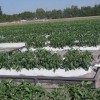Abstract
Bell pepper (Capsicum annuum) is an important crop for Florida and accounts for a significant fraction of its agricultural water use. Most of it is produced in south Florida, where the water table is shallow. Seepage irrigation is one of the most common systems used in south Florida for growing plastic-mulched vegetable crops, including bell pepper. Compared with an open field production, covering the soil with impermeable plastic reduces soil evaporation and increases transpiration. This 3-page fact sheet summarizes the results from a crop water use study for the seepage-irrigated pepper in south Florida. Written by Sanjay Shukla, Niroj Shrestha, and Fouad H. Jaber, and published by the UF Department of Agricultural and Biological Engineering, August 2014.
References
Allen, R.G., Pereira, L.S., Raes, D., Smith, M., 1998. Crop evapotranspiration. Guidelines for computing crop water requirements. FAO Irrigation and Drainage paper 56. Rome, Italy. Food and Agriculture Organization of United Nations.
Marella, R.L., 1999. Water withdrawals, use, discharge and trends in Florida 1995. USGS Water resources investigations report 99-4002. Tallahassee, FL.
Mossler, M., Aerts, M.J., Nesheim, O.N. 2012. Florida crop/pest management profiles: Bell peppers. University of Florida IFAS extension paper no. Cir 1240. https://doi.org/10.32473/edis-pi032-2012
Shukla, S., Jaber, F.H., Goswami, D., Srivastava, S. 2012. Evapotranspiration losses for pepper under plastic mulch and shallow water table conditions. Irrigation Science DOI 10.1007/s00271-012-0327-3. https://doi.org/10.1007/s00271-012-0327-3
Locascio, S.J. 2005. Management of irrigation for vegetables: Past, present, and future. Hort Technology 15(3): 482-485. https://doi.org/10.21273/HORTTECH.15.3.0482

